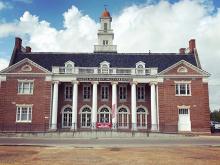Former military-run course. Excellent layout, exceptional greens.
Number of holes: 9
Par: 36
Championship Yardage: 3500 yds.
"
Old Depot Museum
Phone:
334-874-2197
Fax:
334-874-1221
Schedule:
Open M–Sat. 10–4, Sun. by appt.
Mailing:
P.O. Box 1391
Selma, AL 36702
Discount:
senior, group, other
Admission:
Admission charged
Accepted:
Personal Checks
Travelers Checks
Interpretive history museum in 1891 railway depot. Artifacts from pre-history Indians through Voting Rights era. Civil War room, Black Heritage wing, military room (pre WWI–Persian Gulf). Victorian firehouse, antique rail cars.
Accessibility:
Mobility Impaired (ramps, elevators)
Related attractions
Driving/walking tours only. 5 relocated historic structures from area: McKinnon-Riggs doctor's office, 1830 Calhoun law office, Siegel servant house, Gillis House, historic pigeon cote.
National landmark; symbol of momentous changes in Selma, Alabama, America and world. Figured prominently in Voting Rights struggle when Dr. Martin Luther King, Jr. led marchers across bridge on journey toward voting rights attainment.
Restored 19th-century commercial district. Brick streets, antique stores, fountains, restored bridge-tender's house. 3 parks, antebellum St. James Hotel (riverfront), Old Depot Museum, National Voting Rights Museum, new Slavery and Civil War Museum.
20 memorials highlight history of Voting Rights movement in Selma as visitors pass First Baptist Church, George Washington Carver homes, Brown Chapel AME Church, Martin Luther King, Jr. monument and other sites.
Driving range, snack bar, complete line of merchandise. Very challenging but golfer-friendly.
Graves of Confederate soldiers and prominent Selma residents. Includes statue of Elodie B. Todd, half-sister of Mary Todd Lincoln; mausoleum of Vice President William Rufus King; and Benjamin Sterling Turner, Alabama's first Black congressman.
Largest historic district in state includes beautiful antebellum Sturdivant Hall. More than 1250 buildings dating from 1820s. Windshield tour (brochures available from Chamber) contains 116 historic sites.
Located near foot of Edmund Pettus Bridge, museum offers pictorial history of voting rights struggle. Displays exceptional record of events and participants that made Civil Rights history.
Alabama's 1st permanent capital and most famous ghost town. Archaeological Interpretive Park includes welcome center and education room, picnic area, hiking trails, interpretive signs, historic ruins. New, accessible nature trail.
Visit authentically restored Walton Theatre and courtyard.
Located on 100-acre lake. Fishing, swimming, boat rentals, picnicking, improved and primitive camping, play areas, hiking trails.
Located in turn-of-century cottage. Showcase for award-winning artists of Selma Art Guild.
1840 Greek Revival cottage converted to art gallery which displays regional and local art.
Sister museum to National Voting Rights Museum. Permanent and temporary exhibits that depict historical, topical and provocative impacts and occurances during the period of slavery in America.
The building was used as a Confederate hospital and features the Lewis Collection of Civil War memorabilia.
Outstanding example of Neoclassical architecture erected in 1853. 10-room mansion purchased by Sturdivant Museum Assn. Museum gift shop in original kitchen area. Formal gardens of native flowers, trees and shrubs.
Built in 1847 by Selma Masonic Order to serve as university. Served as Confederate hospital, county courthouse and military school. Restored to original beauty. Features Lewis collection of Civil War memorabilia, medical museum, political museum.

